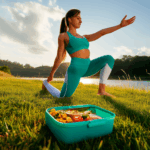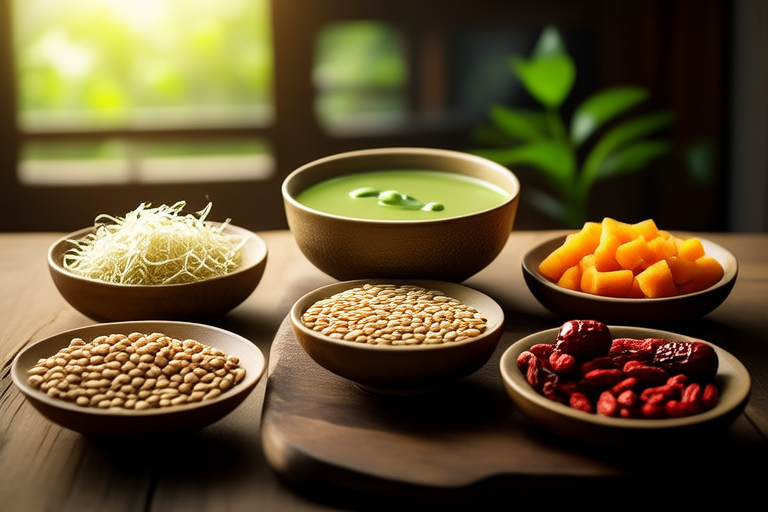Stay Healthy Year-Round: Methods of Health Preservation in Four Seasons
Health preservation is a year-round endeavor that requires adaptation to the changing seasons. Each season brings unique challenges and opportunities for maintaining our well-being. By understanding how to adjust our lifestyle practices—diet, exercise, sleep, mental well-being, and disease prevention—we can stay healthy no matter what the weather. This article explores these strategies for each of the four seasons.
Spring: Embrace Renewal and Growth
Spring is a time of renewal and growth, both in nature and within ourselves. As temperatures rise and days lengthen, it’s an ideal time to shake off the lethargy of winter and embrace new beginnings. Here are some ways to maintain your health during this vibrant season:
Diet
Incorporate fresh, seasonal produce into your meals to support your body’s transition from winter to spring. Leafy greens, such as spinach and kale, are excellent sources of vitamins and minerals that help detoxify the liver and promote digestive health. Include more fruits like strawberries and apricots, which are rich in antioxidants and fiber. Spring is also a great time to experiment with herbs and spices like parsley, cilantro, and ginger, which can add flavor while offering health benefits.
Exercise
With longer daylight hours, spring is perfect for outdoor activities. Start your day with a morning walk or jog in the park. Join a local running group or try a new sport like cycling or tennis. Yoga and Pilates are also beneficial as they help improve flexibility and balance. Additionally, consider strength training exercises to build muscle mass, which can boost metabolism and enhance overall fitness.
Sleep
As daylight saving time begins, it’s important to adjust your sleep schedule accordingly. Aim for seven to nine hours of quality sleep per night. Create a relaxing bedtime routine that includes reading, meditation, or gentle stretching to signal to your body that it’s time to wind down. Avoid screens at least an hour before bed to reduce blue light exposure, which can interfere with melatonin production and disrupt sleep patterns.
Mental Well-being
Spring’s increased sunlight can lift your mood and energy levels, but it’s still crucial to nurture your mental health. Practice mindfulness techniques, such as deep breathing or guided imagery, to manage stress. Engage in creative pursuits like painting, writing, or gardening to stimulate your mind and foster a sense of accomplishment. Connecting with friends and family through social gatherings or volunteer work can also provide emotional support and strengthen relationships.
Preventive Measures Against Diseases
Flu season may be winding down, but allergies and respiratory infections remain common concerns in spring. To protect yourself, wash your hands frequently and avoid touching your face. Stay hydrated by drinking plenty of water, which helps flush out toxins and keeps mucous membranes moist. Consider taking probiotics or eating fermented foods to support gut health, which plays a key role in immune function.
Summer: Thrive in Warmth and Sunlight
Summer offers longer days, warmer temperatures, and abundant sunshine—perfect conditions for enjoying outdoor activities. However, it’s essential to take precautions against heat-related illnesses and other summertime hazards. Here’s how you can thrive during this lively season:
Diet
Summer calls for lighter, refreshing meals that keep you hydrated and energized. Focus on eating plenty of fruits and vegetables, especially those high in water content, like cucumbers, tomatoes, and watermelon. Grilled fish, lean meats, and whole grains are good choices for protein-rich meals. Incorporate cooling spices like mint, cilantro, and basil into your dishes to counteract the effects of heat. Stay away from heavy, greasy foods that can cause indigestion or sluggishness.
Exercise
Taking advantage of warm weather, engage in regular physical activity outdoors. Swimming, hiking, kayaking, and playing beach volleyball are fun options that provide cardiovascular exercise while keeping you cool. If you prefer indoor workouts, visit air-conditioned gyms or community centers where you can participate in classes like Zumba or spin cycling. Regardless of your preferred activity, always wear appropriate attire and apply sunscreen with at least SPF 30 to protect your skin from harmful UV rays.
Sleep
Even though summer nights tend to be shorter due to later sunsets, maintaining a consistent sleep schedule remains vital. Keep your bedroom cool and dark by using fans, blackout curtains, or white noise machines if necessary. Limit caffeine intake in the afternoon and evening, as it can interfere with sleep quality. Consider napping for 20-30 minutes midday to refresh yourself without disrupting nighttime rest.
Mental Well-being
Summer provides ample opportunities for relaxation and enjoyment. Spend time outdoors in nature, whether it’s picnicking in the park, camping in the mountains, or simply sitting by the ocean. These experiences can reduce stress, increase creativity, and enhance overall happiness. Additionally, challenge yourself intellectually through puzzles, games, or learning a new skill. Social connections are equally important; plan outings with loved ones or join clubs based on shared interests.
Preventive Measures Against Diseases
Summer poses risks such as dehydration, sunburn, and food poisoning. Drink at least eight glasses of water daily and carry a reusable water bottle when you’re out and about. Apply broad-spectrum sunscreen every two hours when exposed to direct sunlight. When preparing food outdoors, ensure proper hygiene by washing hands thoroughly, using clean utensils, and storing perishables in insulated bags or coolers. Be cautious around water bodies to prevent drowning accidents.
Autumn: Prepare for Cooler Weather
Autumn brings cooler temperatures and colorful foliage, signaling the end of summer and the approach of winter. While many enjoy this transitional period, it’s critical to prepare your body for colder weather. Below are suggestions for staying healthy during autumn:
Diet
As the weather cools, incorporate warming foods into your diet. Soups and stews made with root vegetables, lentils, and whole grains are nutritious and comforting. Try adding spices like cinnamon, nutmeg, and cloves, which have anti-inflammatory properties and can help regulate blood sugar levels. Increase your intake of vitamin D-rich foods, such as fatty fish, eggs, and fortified dairy products, since sunlight exposure decreases during autumn and winter months.
Exercise
Continue exercising regularly even as temperatures drop. Participate in indoor sports like basketball, squash, or badminton at local gyms or community centers. Cross-country skiing, snowshoeing, and ice skating are enjoyable winter activities that combine cardio and strength training. If you prefer low-impact exercises, try walking or indoor cycling. No matter what form of exercise you choose, remember to warm up before starting and cool down afterward to prevent injuries.
Sleep
With shorter days and longer nights, autumn presents an opportunity to establish better sleep habits. Gradually shift your bedtime earlier by 15 minutes each night until you reach your desired schedule. Maintain a comfortable sleeping environment by adjusting thermostat settings and using weighted blankets if needed. Establish a relaxing pre-sleep routine that includes reading, listening to soothing music, or practicing progressive muscle relaxation techniques.
Mental Well-being
Autumn can bring feelings of melancholy or sadness known as seasonal affective disorder (SAD). Combat these emotions by spending time outdoors during daylight hours, even if it’s just for a short walk. Engage in hobbies that bring joy, such as knitting, baking, or crafting. Seek professional counseling if symptoms persist or worsen over time. Maintaining strong social bonds through regular check-ins with friends and family can also alleviate feelings of isolation.
Preventive Measures Against Diseases
Autumn marks the beginning of flu season. Get vaccinated against influenza early in the season to protect yourself and others. Wash your hands frequently and cover your mouth and nose when coughing or sneezing to prevent the spread of germs. Stay home when feeling unwell to avoid infecting others. Regularly clean and disinfect surfaces in your home, particularly those touched often like doorknobs and light switches.
Winter: Stay Cozy and Active
Winter can be challenging for maintaining health due to cold temperatures, reduced sunlight, and increased indoor time. Yet, with thoughtful planning, you can enjoy this season comfortably and safely. The following tips will guide you through winter health preservation:
Diet
Eat nutrient-dense foods that provide warmth and energy. Soups and stews featuring hearty ingredients like potatoes, carrots, and onions are filling and satisfying. Include omega-3 fatty acids found in salmon, walnuts, and flaxseeds, which promote heart health and reduce inflammation. Drink herbal teas like chamomile or peppermint to soothe sore throats and ease digestion. Avoid excessive consumption of sugary snacks and refined carbohydrates, which can lead to weight gain and decreased immunity.
Exercise
Keep active indoors when outdoor conditions are unfavorable. Join a gym membership or purchase home workout equipment like resistance bands or dumbbells. Try virtual fitness classes via streaming services for variety and convenience. If possible, bundle up and go outside for brisk walks or snowshoeing excursions. Exercise releases endorphins, improving mood and combating seasonal depression. Always dress appropriately for the weather, wearing layers that wick moisture away from the skin.
Sleep
Dark evenings may make falling asleep easier, but they can also disrupt circadian rhythms. Use blackout curtains or eye masks to block out excess light. Invest in a humidifier to combat dry air, which can irritate nasal passages and cause congestion. Establish a consistent sleep routine by going to bed and waking up at the same times every day, including weekends. Limit screen time before bed to minimize blue light exposure and promote deeper sleep.
Mental Well-being
Winter’s shorter days and colder weather can contribute to feelings of loneliness or depression. Stay connected with others through phone calls, video chats, or socially distanced meetups. Participate in activities that bring fulfillment, such as reading books, watching movies, or playing board games. Consider joining online support groups focused on specific interests or challenges. Practicing gratitude through journaling or expressing appreciation to loved ones can foster positive emotions.
Preventive Measures Against Diseases
Protect yourself from colds and flu by practicing good hygiene, such as washing hands regularly and covering coughs and sneezes. Stay physically active to boost circulation and immune function. Maintain a balanced diet rich in vitamins and minerals. Monitor indoor humidity levels and use humidifiers if necessary to prevent dry air from causing discomfort. Take extra care when traveling during winter holidays to avoid spreading germs.










